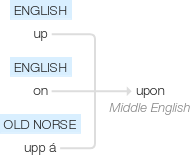Upon
Middle English: from up + on, suggested by Old Norse upp á .
wiktionary
From Middle English upon, uppon, uppen, from Old English upon, uppon, uppan(“on, upon, up to, against, after, in addition to”), equivalent to up(“adverb”) + on(“preposition”). Cognate with Icelandic upp á, upp á(“up on, upon”), Swedish på(“up on, upon”), Danish på(“up on, upon”), Norwegian på(“up on, upon”).
etymonline
upon (prep.)
early 12c., from Old English uppan (prep.) "on, upon, up to, against," from up (adv.) + on (prep.); probably influenced by Scandinavian sources such as Old Norse upp a.
On, Upon. These words are in many uses identical in force, but upon is by origin (up + on) and in use more distinctly expressive of motion to the object from above or from the side. On has the same force, but is so widely used in other ways, and so often expresses mere rest, that it is felt by careful writers to be inadequate to the uses for which upon is preferred. [Century Dictionary, 1895]
upon (adv.)
Old English upon; see up (adv.) + on (prep.).
